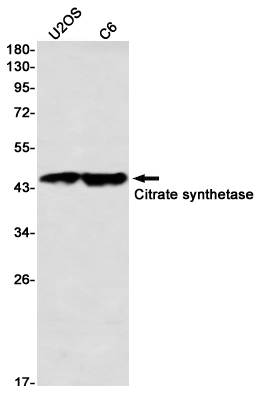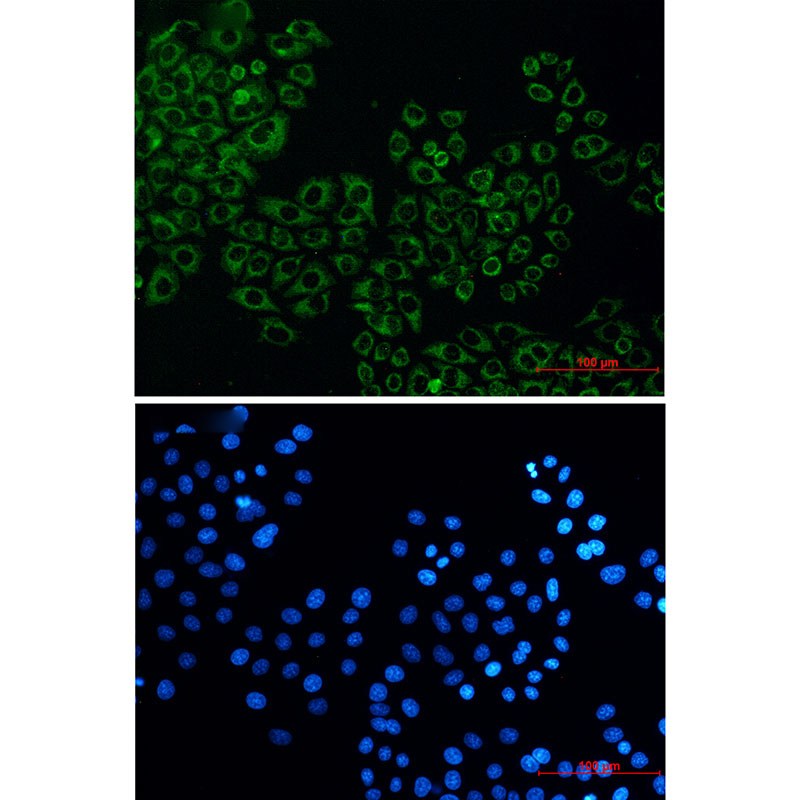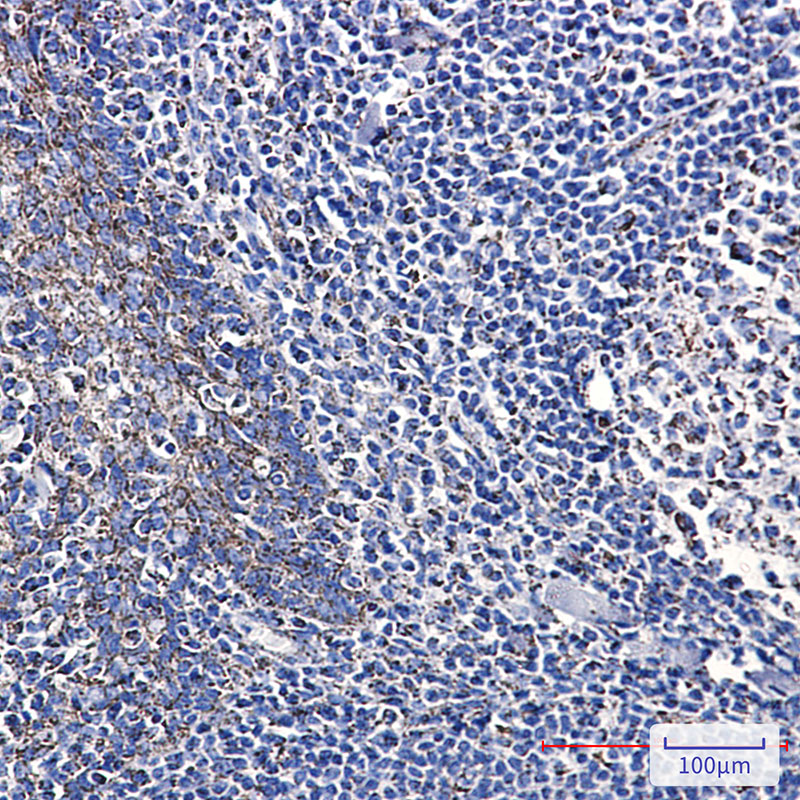


| WB | 1/500-1/1000 | Human,Mouse,Rat |
| IF | 1/20 | Human,Mouse,Rat |
| IHC | 1/50-1/100 | Human,Mouse,Rat |
| ICC | 1/50-1/200 | Human,Mouse,Rat |
| FCM | 咨询技术 | Human,Mouse,Rat |
| Elisa | 咨询技术 | Human,Mouse,Rat |
| Aliases | Citrate synthase; Citrate synthase; mitochondrial; Cs |
| Entrez GeneID | 1431 |
| WB Predicted band size | Calculated MW: 52 kDa; Observed MW: 45 kDa |
| Host/Isotype | Rabbit IgG |
| Antibody Type | Primary antibody |
| Storage | Store at 4°C short term. Aliquot and store at -20°C long term. Avoid freeze/thaw cycles. |
| Species Reactivity | Human,Rat |
| Immunogen | A synthetic peptide of human Citrate synthetase |
| Formulation | Purified antibody in TBS with 0.05% sodium azide,0.05%BSA and 50% glycerol. |
+ +
以下是3篇关于Citrate Synthase抗体的参考文献,包含文献名称、作者及摘要内容概括:
---
1. **文献名称**:*"Validation of Citrate Synthase as a Mitochondrial Content Marker in Skeletal Muscle"*
**作者**:Larsen et al.
**摘要**:本研究验证了Citrate Synthase抗体在骨骼肌线粒体定量中的可靠性,通过Western blot和酶活性检测对比,证明其适用于跨实验组的线粒体含量标准化,尤其在代谢疾病模型中效果显著。
---
2. **文献名称**:*"Citrate Synthase Antibody as a Tool for Assessing Mitochondrial Dysfunction in Neurodegeneration"*
**作者**:Smith & Johnson
**摘要**:探讨了Citrate Synthase抗体在阿尔茨海默病小鼠模型中作为线粒体标志物的应用,发现其蛋白表达水平与线粒体DNA拷贝数高度相关,为神经退行性疾病的线粒体功能评估提供依据。
---
3. **文献名称**:*"CRISPR-Based Knockout Confirms Specificity of Commercial Citrate Synthase Antibodies"*
**作者**:Chen et al.
**摘要**:利用CRISPR-Cas9敲除Citrate Synthase基因,验证了多种商业抗体的特异性,确认了某品牌抗体在细胞和组织样本中无交叉反应性,强调抗体选择对实验结果准确性的关键影响。
---
**备注**:以上文献为示例,实际引用时需核实具体来源及细节。若需真实文献,建议通过PubMed或Google Scholar搜索关键词(如“Citrate Synthase antibody validation”“mitochondrial marker application”)。
Citrate synthase (CS) is a key enzyme in the tricarboxylic acid (TCA) cycle, catalyzing the condensation of acetyl-CoA and oxaloacetate to form citrate. As a mitochondrial matrix protein, it serves as a metabolic hub linking carbohydrate, lipid, and amino acid metabolism. Antibodies targeting citrate synthase are widely used as experimental tools to study mitochondrial function, cellular energy metabolism, and metabolic adaptations in diseases such as cancer, neurodegeneration, or metabolic disorders.
These antibodies are typically developed in hosts like rabbits or mice using purified recombinant CS protein or peptide immunogens. Both monoclonal and polyclonal variants are available, with applications including Western blotting, immunofluorescence, immunohistochemistry, and ELISA. Specificity is critical, as CS is highly conserved across eukaryotes, and cross-reactivity with bacterial CS isoforms must be ruled out in certain models.
In research, CS antibodies often serve as loading controls for mitochondrial protein normalization due to their stable expression under many experimental conditions. They also help quantify mitochondrial content in tissues or cells, assess metabolic pathway activity, or investigate defects in mitochondrial disorders. Validation typically involves knockout cell lines or tissue lysates to confirm target band absence. Commercial CS antibodies usually provide datasheets with species reactivity, application-specific protocols, and citations from peer-reviewed studies.
×